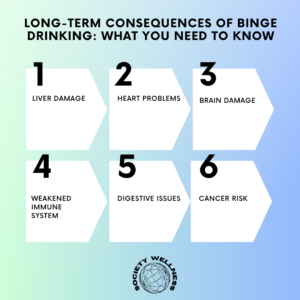Binge drinking, defined as consuming large amounts of alcohol in a short period, is a prevalent issue, especially among young adults. While it might seem like a harmless way to socialize, the consequences of binge drinking can be severe and far-reaching.
Short-term effects of binge drinking are often immediate and noticeable. Impaired judgment, slowed reaction times, and decreased coordination can lead to accidents, injuries, and risky behaviors. Alcohol poisoning, a potentially fatal condition, is a serious risk associated with excessive alcohol consumption. Additionally, blackouts and memory lapses are common occurrences after binge drinking, causing confusion and distress.
Long-Term Effects of Binge Drinking
While the short-term consequences of binge drinking are often immediate and apparent, the long-term effects can be far more insidious and damaging. Repeated episodes of binge drinking can have a profound impact on various organs and systems in the body.
- Liver Damage: Excessive alcohol consumption is a leading cause of liver disease, including fatty liver, hepatitis, and cirrhosis. These conditions can have severe consequences, including liver failure.
- Heart Problems:Binge drinking increases the risk of heart disease, high blood pressure, irregular heartbeats, and stroke.
- Brain Damage: Chronic alcohol abuse can lead to cognitive impairment, memory loss, and an increased risk of dementia.
- Weakened Immune System: Excessive alcohol consumption can suppress the immune system, making the body more susceptible to infections.

- Digestive Issues: Binge drinking can irritate the stomach lining, leading to ulcers, pancreatitis, and other digestive problems.
- Cancer Risk: Alcohol consumption is linked to an increased risk of several types of cancer, including mouth, throat, liver, and breast cancer.
Binge Drinking and Relationships
Binge drinking can have a devastating impact on personal relationships. The impaired judgment, impulsive behavior, and emotional volatility associated with excessive alcohol consumption can strain bonds with friends, family, and romantic partners.
- Strained Communication: Alcohol often hinders effective communication, leading to misunderstandings, arguments, and emotional distance.
- Trust Issues: Binge drinking can erode trust within relationships as secrets, lies, and broken promises become more prevalent.
- Financial Strain: Excessive alcohol consumption can lead to financial difficulties, putting additional stress on relationships.
- Neglect of Responsibilities: Prioritizing drinking over family, work, or school obligations can damage relationships.
- Increased Risk of Violence: Alcohol is often a factor in domestic violence and other forms of aggression within relationships.
Seeking Help for Binge Drinking
Recognizing the signs of binge drinking and its harmful effects is the first step towards recovery. If you or someone you know is struggling with excessive alcohol consumption, it’s essential to seek professional help.
Overcoming the Stigma:
It’s important to remember that seeking help for binge drinking is a sign of strength, not weakness. Overcoming the stigma associated with alcohol abuse is crucial for accessing the necessary support and resources.
Treatment Options:
- Detoxification: In some cases, medically supervised detoxification may be necessary to manage withdrawal symptoms.
- Therapy: Individual, group, or family therapy can address underlying issues and develop coping strategies.
- Medication-Assisted Treatment: Certain medications may be prescribed to reduce alcohol cravings and prevent relapse.
- Support Groups: Organizations like Alcoholics Anonymous (AA) can provide a supportive community and recovery resources.
Building a Support Network:
Having a strong support system is essential for long-term recovery. Encouraging friends, family, and loved ones to be involved in the recovery process can make a significant difference.
Prevention Strategies for Binge Drinking
Preventing binge drinking requires a multifaceted approach that involves individuals, families, communities, and policymakers. By implementing effective prevention strategies, we can reduce the prevalence of binge drinking and its associated harms.
Individual Strategies:
- Setting Limits: Establish personal drinking limits and stick to them.
- Alternative Activities: Find enjoyable activities that don’t involve alcohol.
- Education: Learn about the risks of binge drinking and the importance of moderation.
Parental Involvement:
- Open Communication: Talk openly with your children about the dangers of alcohol.
- Setting Rules: Establish clear rules and consequences regarding alcohol use.
- Monitoring Behavior: Pay attention to changes in your child’s behavior or social interactions.
Community and Policy Interventions:
- Raising the Legal Drinking Age: Research has shown that raising the legal drinking age can reduce alcohol-related injuries and deaths.
- Enforcing Alcohol Laws: Strict enforcement of underage drinking laws can deter young people from engaging in risky behavior.
- Media Literacy: Promote media literacy to help young people critically evaluate alcohol advertising and messages.
- Community-Based Programs: Support programs that focus on prevention, education, and early intervention.
The Role of Media and Popular Culture in Binge Drinking
Media and popular culture play a significant role in shaping societal attitudes and behaviors, including those related to alcohol consumption. The portrayal of alcohol in movies, television shows, music, and social media can influence individuals’ perceptions and normalize binge drinking.
- Glamorization of Alcohol: Media often portrays alcohol consumption as a symbol of fun, success, and social acceptance. This can create unrealistic expectations and encourage binge drinking.
- Underage Drinking: The media’s portrayal of young people engaging in binge drinking can normalize this behavior among teenagers and young adults.
- Social Media Influence: Platforms like Instagram and TikTok often feature alcohol-related content, which can contribute to peer pressure and create a false sense of normalcy around binge drinking.
It’s essential to be critical of media messages and to promote alternative narratives that emphasize the negative consequences of binge drinking. By understanding the impact of media on attitudes and behaviors, we can work towards creating a culture that prioritizes health and well-being.
Contact LGBTQ Addiction Centers for Alcohol Addiction Treatment Today
Binge drinking can have severe consequences for your physical and mental health, as well as your relationships and overall well-being. If you or someone you know is struggling with substance abuse, seeking professional help is crucial.
LGBTQ Addiction Centers offers specialized treatment programs tailored to the unique needs of the LGBTQ+ community. Our evidence-based approach combines therapy, medication-assisted treatment, LGBTQ addiction treatment and peer support to create a comprehensive recovery plan.
Our services include:
- Individualized treatment plans: Addressing the specific challenges and goals of each client.
- Group therapy: Providing a supportive environment for sharing experiences and building connections.
- Family therapy: Involving loved ones in the recovery process to foster understanding and support.
- Aftercare planning: Developing strategies for maintaining sobriety and preventing relapse.
Our team of experienced professionals is committed to creating a safe and inclusive space for individuals to heal and thrive. We understand the importance of addressing the unique challenges faced by the LGBTQ+ community, and our LGBTQ+ alcohol addiction treatment programs are designed to meet those needs.
FAQs on Binge Drinking
Is binge drinking always associated with alcoholism?
While not everyone who binge drinks becomes an alcoholic, it’s a risk factor and can lead to addiction.
How can I tell if I have a binge drinking problem?
If you frequently engage in binge drinking, experience negative consequences, or feel unable to control your alcohol consumption, it may indicate a problem.
What are the short-term effects of binge drinking?
Short-term effects include impaired judgment, slowed reaction times, blackouts, and increased risk of accidents.
What are the long-term effects of binge drinking?
Long-term effects can include liver damage, heart problems, brain damage, and increased risk of certain cancers.
Can binge drinking affect mental health?
Yes, binge drinking can contribute to depression, anxiety, and other mental health issues.
Begin your journey to recovery and wellness with us today.
If you or someone you care about is struggling with binge drinking, LGBTQ Addiction Centers is here to help. Our compassionate team understands the unique challenges faced by the LGBTQ community and is ready to provide the support and guidance you need. Binge drinking can have serious consequences, but with the right help, recovery is within reach. At LGBTQ Addiction Centers, you’ll find more than just a treatment program – you’ll discover a safe and affirming space dedicated to your well-being and success. Take the first step toward a healthier future. Call us at (888) 598-9510 today or reach out online.
